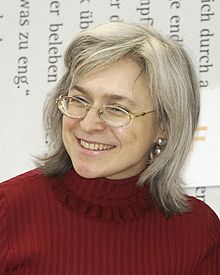
Back Политковскаиа, Анна Степан-иԥҳа Abkhazian Anna Politkofskaja Afrikaans آنا بوليتكوفسكايا Arabic آنا بوليتكوفسكايا ARZ Anna Politkóvskaya AST Anna Politkovskaya Azerbaijani آنا پولیتکوفسکایا AZB Anna Politkovskaya BCL Ганна Сцяпанаўна Паліткоўская Byelorussian Ганна Паліткоўская BE-X-OLD
Anna Politkovskaya | |
|---|---|
| Анна Политковская | |
 Politkovskaya in 2005 | |
| Born | Anna Stepanovna Mazepa 30 August 1958 New York City, U.S. |
| Died | 7 October 2006 (aged 48) Moscow, Russia |
| Cause of death | Assassination |
| Resting place | Troyekurovskoye Cemetery, Moscow |
| Citizenship |
|
| Alma mater | Moscow State University |
| Occupation | Journalist |
| Spouse | Alexander Politkovsky |
| Children | 2 |
| Writing career | |
| Period | 1982–2006 |
| Subject | Politics, freedom of the press, human rights, social issues |
Anna Stepanovna Politkovskaya (née Mazepa;[a] 30 August 1958 – 7 October 2006) was a Russian investigative journalist who reported on political and social events in Russia, in particular, the Second Chechen War (1999–2005).[1]
It was her reporting from Chechnya that made her national and international reputation.[2] For seven years, she refused to give up reporting on the war despite numerous acts of intimidation and violence. Politkovskaya was arrested by Russian military forces in Chechnya and subjected to a mock execution. She was poisoned while flying from Moscow via Rostov-on-Don to help resolve the 2004 Beslan school hostage crisis, and had to turn back, requiring careful medical treatment in Moscow to restore her health.
Her post-1999 articles about conditions in Chechnya were turned into books several times;[3] Russian readers' main access to her investigations and publications was through Novaya Gazeta, a Russian newspaper that featured critical investigative coverage of Russian political and social affairs. From 2000 onwards, she received numerous international awards for her work. In 2004, she published Putin's Russia, a personal account of Russia for a Western readership.[4]
On 7 October 2006 (notably, on the 54th birthday of Russian president Vladimir Putin), she was murdered in the elevator of her block of apartments, an assassination that attracted international attention.[5][6][7] In 2014, five men were sentenced to prison for the murder, but it is still unclear who ordered or paid for the contract killing.[8]
Cite error: There are <ref group=lower-alpha> tags or {{efn}} templates on this page, but the references will not show without a {{reflist|group=lower-alpha}} template or {{notelist}} template (see the help page).
- ^ World Politics Review, "Politkovskaya's Death, Other Killings, Raise Questions About Russian Democracy" Archived 2 October 2009 at the Wayback Machine, 31 October 2006
- ^ Hearst, David (9 October 2006). "Obituary: Anna Politkovskaya". The Guardian. ISSN 0261-3077. Retrieved 30 June 2019.
- ^ these were mostly published outside of Russia, see Literature.
- ^ "АННА СТЕПАНОВНА ПОЛИТКОВСКАЯ" [Anna Stepanovna Politkovskaya]. Novaya Gazeta (in Russian). Retrieved 30 June 2019.
- ^ Gilman, Martin (16 June 2009). "Russia Leads Europe In Reporter Killings". Moscow Times. Archived from the original on 25 June 2009. Retrieved 8 August 2009.
- ^ The State of the World's Human Rights (Internet Archive), Amnesty International 2009, Report on Jan–Dec 2008, p. 272: "In June [2008], the Office of the Prosecutor General announced that it had finished its investigation into the killing of human rights journalist Anna Politkovskaya, who was shot dead in Moscow in October 2006. Three men accused of involvement in her murder went on trial in November; all denied the charges. A fourth detainee, a former member of the Federal Security Services who had initially been detained in connection with the murder, remained in detention on suspicion of another crime. The person suspected of shooting Anna Politkovskaya had not been detained by the end of the year and was believed to be in hiding abroad."
- ^ "Anna Politkovskaya: Putin's Russia". BBC News. 9 October 2006. Archived from the original on 7 November 2006. Retrieved 9 October 2006.
- ^ Cite error: The named reference
nytimes-sentences-june2014was invoked but never defined (see the help page).
© MMXXIII Rich X Search. We shall prevail. All rights reserved. Rich X Search